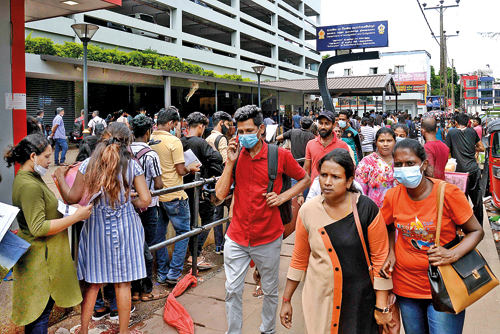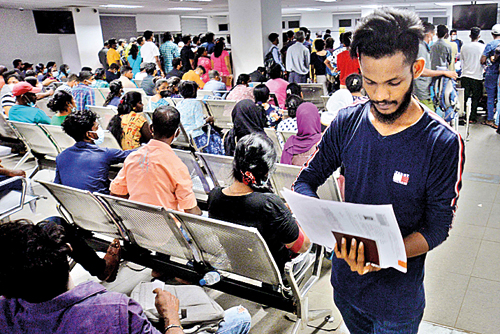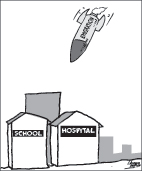News
Exodus of talent carves gaping holes in bankrupt economy

Crowds at the Department of Immigration and Emigration. Pix by Eshan Fernando
Sri Lanka is witnessing a fall in service sector employment and skilled professionals as a result of increased emigration following the economic collapse. Many are selling their homes and leaving for good with their families.
This has affected many areas of the public sector, including education, healthcare, and administrative services. The emigration of qualified professionals has also slowly started to take a toll on the private sector.
Many highly skilled and experienced employees, including school teachers, graduates, senior employees of ministries, and skilled professionals from the private sector, have already left.
The shortage of state sector employees has significantly impacted the education sector. Many schools are struggling to find qualified teachers.
“This has resulted in large class sizes and future quality of education for students,” an official from the Education Ministry said.
According to a report by the International Organisation for Migration (IOM), Sri Lanka is experiencing a significant ‘brain drain’ with many skilled workers leaving the country for better opportunities abroad.
 The report notes that the health sector is particularly affected, with many doctors, nurses, and other medical professionals leaving for higher-paying jobs overseas. Moreover, hospitals and clinics face staff shortages, leading to longer waiting times and reduced quality of care.
The report notes that the health sector is particularly affected, with many doctors, nurses, and other medical professionals leaving for higher-paying jobs overseas. Moreover, hospitals and clinics face staff shortages, leading to longer waiting times and reduced quality of care.
The Government had planned to reduce the salaries in the healthcare sector by 15%, which would result in more people leaving, the Government Medical Officers’ Association (GMOA) spokesman Dr. Chamil Wijesinghe said.
“On 13 February, the secretary to the Ministry of Health issued a circular instructing the reduction of our salaries by 15%. The entire healthcare sector had already been in crisis. Most health sector workers found it difficult to make ends meet, and many people are leaving the country,” he said.
Moreover, the shortage of state sector employees has resulted in an increased workload for those who remain, leading to burnout and lower productivity. An official from the Ministry of Public Administration, Home Affairs, Provincial Council, and Local Government said employees are often overworked and underpaid.
A recent study by the Ministry regarding those exiting from the state sector found that there are nearly 5,416 vaccines as of 2020. This shortage is particularly acute in the education sector, with over 1,800 teacher vacancies reported in 2021.
“While there is no comprehensive data on the number of skilled workers or state sector employees who have emigrated over the past couple of months, these studies suggest that the country is experiencing a significant brain drain,” the ministry official said.
A study by the Asian Development Bank (ADB) found that many Sri Lankan professionals, including engineers, accountants, and IT specialists, are leaving the country. This has resulted in a shortage of skilled workers and has affected the competitiveness of industries and businesses.
It is estimated that the IT industry has lost almost 4,000 people in 2020 alone, according to the Sri Lanka Association of Software and Services Businesses.
According to Milhan Hasin, an IT professional for more than a decade, there are multiple issues. “There are a lot of individuals in the IT sector who are not able to find employment, and many like me are considering emigrating. The situation only seems to be worsening, and it’s not just the lack of job opportunities that are driving experts away, but also the tax reforms.”
Income tax rates for top earners have increased dramatically, making it less desirable for IT professionals to remain.
 “The new tax system has impacted me in several ways, and I find it challenging to sustain my standard of living. Improving my quality of life seems entirely out of the question. Despite the Government’s promises, no one has confidence in any of the parliamentarians.
“The new tax system has impacted me in several ways, and I find it challenging to sustain my standard of living. Improving my quality of life seems entirely out of the question. Despite the Government’s promises, no one has confidence in any of the parliamentarians.
“The burden of the new tax system has fallen on the common people, and it feels unfair to have to struggle so hard to make ends meet while those in power continue to enjoy privileges. I believe it is essential for the Government to address the people’s concerns and work towards a fair system for all,” Mr. Hasin said.
He said the emigration of skilled professionals would lead to a drop in foreign investment, lower productivity, and sluggish economic expansion. “It’s essential for the government to change the tax setup and provide incentives to retain professionals. It’s time to act and create a favourable environment for IT professionals to stay.’’
The best way to say that you found the home of your dreams is by finding it on Hitad.lk. We have listings for apartments for sale or rent in Sri Lanka, no matter what locale you're looking for! Whether you live in Colombo, Galle, Kandy, Matara, Jaffna and more - we've got them all!

